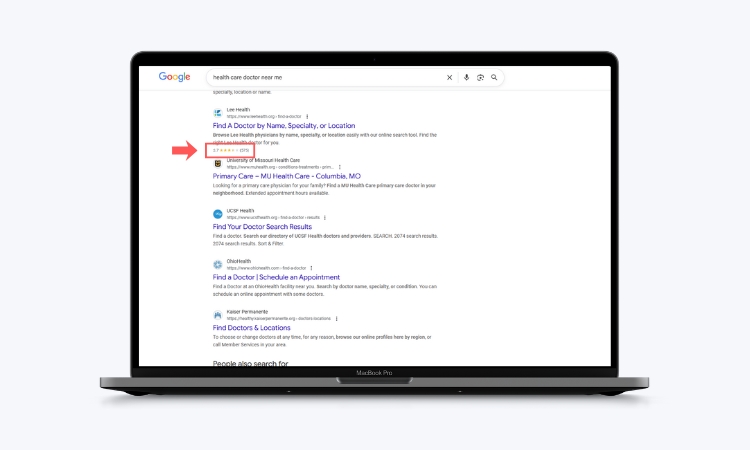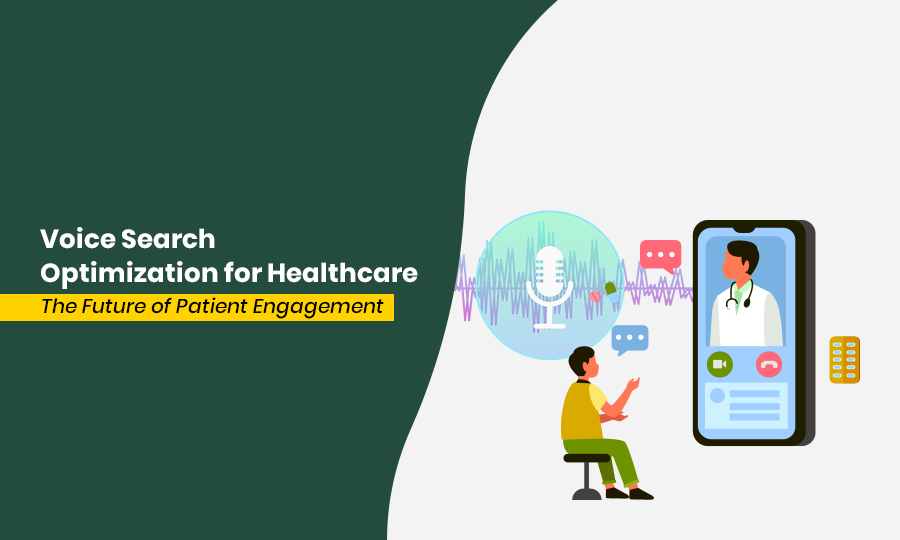Imagine lying on your couch, scrolling through your phone, and saying, “Hey Google, find the best dentist near me,” and getting a list of top dentists in your area. Sounds interesting, right? Do you know, over 20% of mobile searches are done by voice? In recent years, voice search has revolutionized the way customers interact with businesses, especially in the healthcare industry. Voice search optimization for healthcare has been on the rise with virtual assistants like Siri, Alexa, and Google Assistant, making it easier for patients to access the information they are looking for online.
This is why more and more healthcare businesses are adopting voice search optimization for their business. Amidst this, a lot of healthcare businesses are struggling to stand out from the crowd and get the attention of their target patients because they do not have the proper understanding of implementing voice search for their business.
If you are just starting out and find it challenging to optimize your website for voice search, then this blog is for you. It will discuss what voice search optimization is for medical practices, its benefits, tips to optimize for voice search, challenges, tools, and more. So, let’s get started.
What is Voice Search Optimization for Healthcare
Voice Search Optimization for medical businesses includes adapting a healthcare practice’s online content and website to enhance its visibility in voice search results from voice assistants such as Siri, Alexa, and Google Assistant.
This approach focuses on offering conversational and direct answers to patient queries, such as “What are the symptoms of breast cancer?” to make sure the practice’s information is chosen by voice-activated devices and discovered by prospective patients using natural language.
Why Should Healthcare Providers Optimize for Voice Search
Now that you have a clear idea of what voice search optimization is for healthcare providers, let us look into the benefits it offers.
- Better Patient Experience

Voice search is a hands-free strategy that allows patients to look for crucial healthcare information without the need to type their queries. When patients can easily find your healthcare practice and access the information they need, they feel more satisfied, enhancing the overall patient experience.
This positive experience you offer can enhance patient trust and satisfaction, increasing the likelihood of getting chosen by your potential patients for their healthcare needs.
- Higher Website Rankings

As voice search optimization includes optimizing your website’s content to make sure it aligns with voice search queries, it can positively impact your website’s overall SEO. When Google and other search engines determine rankings, they consider factors such as content quality, website structure, and relevance.
When your website is well-optimized for voice search, it performs better in search engine result pages, enhancing your practice’s online visibility. Not only that, but effective voice search optimization can also help healthcare websites rank higher in local search results.
- Competitive Edge

Many healthcare practices have yet to completely adopt voice search optimization for their website. By being an early adopter of this technology, healthcare practices can gain a competitive edge in the local market.
When prospective patients discover that your healthcare practice is easily accessible through voice search, they are more likely to choose your healthcare business over others.
- Foster Patient Trust

By optimizing their websites for voice search, healthcare providers can not only make it more accessible to patients but also showcase that their practice is up-to-date with the recent technology trends.
Patients are most likely to trust a practice that adjusts to emerging digital landscapes, as it displays a strong commitment to offering the best possible care.
- Targeted Content Creation

Voice search queries are often longer and more informal in comparison to text-based searches. For instance, someone might search for “best orthopedist” in search engines like Google, but when using voice search, they might say, “Best orthopedic doctors near me?”
Having a deep understanding of these variations can help healthcare practices create content that directly addresses the queries and concerns of voice search users.
Pro Tips to Optimize Your Website for Voice Search
You cannot ignore all the benefits that voice search optimization offers to your business, can you? Optimizing your healthcare website with voice search can immensely contribute to enhancing online visibility.
So, this section of the blog will discuss some of the best tips and tricks to optimize your website to rank on voice search results.
- Conduct Thorough Keyword Research
Healthcare organizations must identify the voice search keywords that are closely related to their businesses. These include location-based terms and long-tail keywords, for instance, “how to fix misaligned teeth” or “emergency cardiologist near me.” Healthcare practices can use tools like Google Keyword Planner to explore common voice search queries.
Here are some best practices that healthcare practices can follow when conducting effective keyword research for voice search optimization.
- Healthcare practices must focus on long-tail keywords as voice searches are often longer and more natural in comparison to typed searches. For example, instead of “Eye doctors”, target phrases like “Who are the best eye doctors for older citizens?”
- Voice search heavily relies on natural language. So, healthcare practices must implement a tool like AnswerThePublic to find common queries related to healthcare.
- As an alternative method, they can also type their main keyword on Google and go through the “People Also Ask” and “Related Searches” sections. These are goldmines of keywords and contain queries from real users and are exceptional for conversational phrases.
- Healthcare professionals can also check Google Search Console for existing question-based queries that their website already ranks for.
- Voice Assistants often extract their answers from search features like featured snippets. By developing dedicated FAQ pages that directly address the common concerns of patients, healthcare practices can ensure they rank in these featured snippets.
- Incorporate bullet points, numbered lists, and headers to make your content easier for search engines to read and extract information from.
- As we have already discussed in this blog, many voice searches have local intent; healthcare practices must make sure to properly optimize their Google Business Profile, implement local keywords like “best psychiatrist in Los Angeles” throughout their content, and encourage patients to leave reviews.
- Structured data offers a clear context to search engines, helping them to understand your content. Implementing the FAQ schema and the LocalBusiness schema can help search engines understand your content better.
- Emphasize Natural Language and Query-based Content
Most voice searches are usually longer and conversational than textual questions. Patients are most likely to say “Which is the nearest cardiology hospital near me” rather than write “nearest cardiology hospital near me.”
This is why leveraging natural language in your blogs, website content, and FAQs can increase the likelihood of matching the intent of these verbal queries.
- Enhance Local SEO
Local SEO is another factor that heavily contributes to improving rankings in voice search results. By optimizing your website for local SEO, healthcare practices can easily rank for local voice search queries.
Many voice searches have local intent, as patients often look for healthcare services within the close proximity of where they are based. In fact, 46% of voice search users look for a local business daily. This is why improving your local search engine optimization strategy is crucial. For effective voice search optimization for healthcare, medical practices must make sure that their business is precisely listed on Google Business Profile and maintain consistency in NAP information (Name, Address, and Phone Number).
Furthermore, in order to strengthen your local SEO to rank for voice search results, healthcare practices must use long tail location-based queries such as “Best dermatology hospitals open on Saturdays in Texas.”
- Optimize for Featured Snippets
Google’s featured snippets are a very convenient way that offers quick and concise answers to patient queries and are often derived from voice search results. Healthcare organizations must structure their content to directly answer the healthcare-related queries of healthcare patients.
Healthcare practices must incorporate bullet points and clear and concise headings to increase the likelihood of your content being featured in voice search results.
- Leverage Schema Markup
Schema markup is code that is added to your website to help search engines provide more informative results for patients. By implementing schema markup on your healthcare website, you can make it easier for search engines to understand your website content better.
This can increase the likelihood of appearing in search results and help your content get noticed by voice assistants such as Siri and Alexa.
- Ensure Mobile-Friendly Website
In 2025, not having a mobile-friendly website can cost you a large amount of traffic, as most of the web traffic comes from mobile devices. According to DemandSage, 56% of patients use voice search to find information about a business on their smartphones.
So, healthcare providers must make sure their website is well-optimized for mobile devices. Moreover, Google also prioritizes mobile-first websites to rank. So, healthcare services must develop a website that is not just responsive and loads quickly but also offers an effortless patient experience on tablets and smartphones.
- Use Structured Data Markup
Structured data markup is a standardized code format that is also known as Schema Markup, which website owners can add to their HTML to help search engines and AI better comprehend the content on a page.
Structured data offers extra context and information about your web page content. Voice search can leverage this structured data to offer more accurate and relevant answers to patient queries.
By implementing structured data markup, healthcare practices can optimize their content for voice search and increase the likelihood of appearing for voice search queries.
- Create FAQs
FAQs or frequently Asked Questions pages are great for voice search optimization as they naturally use conversational language. A clearly structured FAQ page that discusses the common concerns and queries of patients, such as symptoms, billing procedures, and appointment scheduling, can considerably boost your practice’s visibility in the voice search results.
Adding FAQs on your healthcare website can make it easier for search engines to match patient voice queries with your content.
Here are some common examples of FAQs that healthcare providers can consider:
- How can I schedule my appointment with a dentist?
- Are virtual healthcare consultations available in your hospital?
- What insurance does your clinic accept?
Major Challenges in Optimizing Your Healthcare Website with Voice Search
Although for healthcare providers, leveraging voice search can offer an abundance of benefits, however, everything comes with a price. So here are some major challenges of voice search optimization that medical practices must not ignore.
- Medical Accuracy and Authority
Having a deep knowledge of medical accuracy and authority is crucial for successful voice search optimization for healthcare. And as healthcare and medical topics are extremely sensitive and fall under Google’s “Your Money or Your Life” content, they must be at the highest standard of authority and accuracy.
- Risk of Misinformation: Healthcare practices must eliminate the risk of false and inaccurate information that is being provided by voice assistants, which is extracted from content that might lack verified credentials. Inaccurate medical advice or information can lead to serious consequences for a patient’s health.
- Showcasing Authority: A website must signal to both patients and search engines that it is an authoritative source of medical information.
- Content must be accurate and thoroughly reviewed by medical degree holders.
- Publications, credentials, and hospital or clinic affiliations must be clearly displayed.
- All the information should be thoroughly sourced from recognized publications and must be up-to-date.
- Navigating Privacy and Compliance (HIPAA)
If, as a healthcare provider, you wish to optimize your website for voice search, you must be familiar with HIPAA regulations. Dealing with patient data makes privacy non-negotiable for healthcare voice search. So, healthcare providers must strictly follow regulations such as the Health Insurance Portability Act (HIPAA) to safeguard PHI (Patient Health Information).
- Securing Voice Data: If the voice search technology is integrated into your practice’s website, you must handle it securely through proper encryption both when stored and transferred. This is vital for any voice-enabled features, including patient portals or appointment scheduling.
- Managing Patient Trust: Voice assistants can be considered as “listening” devices, which might raise eyebrows on privacy and security. Healthcare providers must be transparent about how voice search is being leveraged, how data is being collected, and even how third-party integrations handle patient data.
- Apprehending Conversational and Local Intent
Understanding conversational and local intent is vital for successful voice search optimization for healthcare. Voice search queries are often conversational, long, and highly specific, which makes them different from traditional text-based searches.
- The shift in keywords: Rather than typing “best dermatologist in Chicago,” a patient might just say, “Who is the best dermatologist in Chicago?”. Optimizing for these question-based, long-tail, and location-specific keywords requires creating content that directly answers patient queries in natural language.
- FAQs and Snippets: Voice assistants often derive information from featured snippets as the direct answer to a patient query. Creating a good FAQ page or section providing clear and brief answers on your healthcare website is a very effective strategy to earn your desired spot in the search engines.
- Local Focus: Most healthcare voice searches have local intent, such as “urgent orthopedic hospitals near me.” This increases the importance of a fully optimized website and updated Google Business Profile.
- Technical SEO and Patient Experience Challenges
The efficiency of voice search heavily depends on a website’s technical performance and user-friendliness.
- Website Speed: Patients using voice search expect instant answers, as oftentimes, people use voice search only when it’s an emergency. And in this case, the least they would want is land on a slow-loading website. Page speed is one of the most significant factors for Google, and it is especially crucial for mobile searches, where most voice queries tend to happen.
- Mobile-First Experience: As voice search is fundamentally used on mobile devices, you must make sure that your healthcare website is completely optimized, with a seamless design and fast loading time. Easy-to-tap buttons for “click-to-call” or appointment booking options are also crucial to offer a positive patient experience.
- Analytics Challenges: Standard analytics platforms often fail to accurately track which traffic comes from voice searches and which comes from text-based searches, making it extremely difficult for healthcare practices to measure the ROI.
The Challenges of Medical Terms and Lack of Lingual Knowledge
Although voice search optimization is emerging and improving, it will still find it hard to understand complex medical phrases, terms, accents, and variations.
- Interpretation Errors: A misinterpretation of a spoken medical term could lead to serious consequences for a patient looking for information online. For instance, if a patient searches for “hypothyroidism” and the voice assistant misinterprets it as “hyperthyroidism,” it could provide incorrect information.
- Lingual Challenges: Voice assistants are very effective with “standard” speech patterns. But when it comes to speech with strong accents or individuals with speech problems, they often fail to parse it. In order to combat this, healthcare practices must consider various patient demographics. According to Statista, 66% of users hesitate to adopt voice technology due to AI’s language coverage.
Tools that Healthcare Services can Implement for Voice Search Optimization
Here are some effective tools and resources that healthcare organizations can implement to optimize their website for voice search successfully.
Tools to Use for Keyword Research
The tools mentioned below can help track the effectiveness of voice search optimization for healthcare practices.
- SEMrush
This tool features voice search analytics, helping healthcare practices monitor competitor performance and identify long-tail keywords for voice search.
This tool can help in voice search optimization by identifying long-tail and question-based keywords (e.g., “how to” and “what is”) using the Keyword Magic Tool of SEMrush. It allows healthcare professionals to monitor and enhance their “share of voice” across various platforms and optimize their local business listings for voice assistants through the Local Toolkit, evaluate, and improve the on-page SEO of their content to rank higher for conversational searches.
- AnswerThePublic
AnswerThePublic is another keyword research tool that can help healthcare practices visualize search questions and suggest queries based on autocomplete data to help them understand how patients are searching.
Voice searches are often longer and more conversational than traditional typed searches. By entering a broad topic into AnswerThePublic to find the specific questions patients are asking, such as “where is” and “how to.”
This tool allows healthcare providers to develop content that directly answers these conversational queries, and you can also structure this content with FAQs and implement the data to convey your strategy for featured snippets and local SEO.
- Google’s “People also Ask”
This element is like a goldmine of information within search results for healthcare organizations, offering relevant queries that patients are searching for.
People Also Ask is an exceptional tool for voice search optimization, as it reveals natural and conversational queries that patients often ask, allowing healthcare professionals to develop content that directly answers them.
By implementing these question-based, conversational keywords into your content, you can boost your chances of getting displayed in voice search results.
Tools to Use for Technical Implementation
- Schema Markup

Using schema markup to incorporate structured data on your healthcare website. This helps search engines understand the context of your content, increasing the chances of your content getting displayed in search results and voice search answers.
- Google PageSpeed Data

No one likes a slow-loading page. Fast-loading pages are very important for voice search users. By using this resource, healthcare organizations can evaluate their healthcare website’s loading speed and gain suggestions to optimize their website performance.
Here is how therapists can use Google PageSpeed Insights for voice search optimization.
- Firstly, healthcare professionals need to navigate to GooglePageSpeed Insights and enter their website’s URL.
- You must focus on both mobile and desktop reports, but prioritize mobile due to the prevalence of mobile voice searches.
- Review Core Web Vitals as these directly influence patient experience and ranking factors.
- Evaluate the Opportunities and Diagnostics sections to identify areas for improvement, such as image optimization, minimizing server response time, and removing render-blocking resources.
- Incorporate recommendations from PageSpeed Insights to minimize loading times. This might include compressing images, incorporating browser caching, optimizing JavaScript and CSS, and using a Content Delivery System
- Now, verify your website to offer a seamless experience across various mobile devices.
- Work on improving Core Web Vitals scores, as these are crucial for patient experience and search engine rankings, including for voice searches.
Tools to Use for Performance
- Google Analytics
Assessing patient behaviour is crucial to understanding what they are likely to search for. By assessing patient behaviour and search queries, healthcare practices can determine what their target patients are searching for and how they are interacting your their medical website.
Healthcare professionals can use Google Analytics to indirectly monitor and optimize for voice search. By implementing Google Analytics, you can monitor metrics like session duration, bounce rates, and pages per session to determine friction points.
- Content Management System
Healthcare practices must make sure their CMS is mobile-friendly and is easy to update. This is because voice search is mostly performed on mobile devices, so a responsive website is a must. For technical implementation, healthcare practices can leverage tools such as TechnicalSEO.com or RankRanger.
RankRanger is a tool that creates JSON-LD markup for various types, automatically includes the required properties for Google, and can be validated using Google’s tools
TechnicalSEO.com is a free tool that can help healthcare professionals make their websites technically search engine-friendly. Medical professionals can use this schema.org structured data generator to develop JSON-LD markups.
Measuring the Effectiveness of Voice Search Optimization: KPIs to Monitor
Here are some key performance metrics of voice search optimization for healthcare that practices must consider:
- Organic Traffic
Voice search results do not always generate a direct click. However, healthcare practices can still track the organic traffic that they are getting from voice searches. Tracking changes in the organic traffic, especially for pages that are well-optimized for voice search, can help medical practices gain valuable data on how their content is performing.
For example, if you have optimized an FAQ page to target common voice search queries, you can easily track how much traffic that web page is receiving over time. A boost in traffic to voice-optimized content indicates a successful voice search effort.
Healthcare professionals can implement tools like Google Analytics and Google Search Console to measure the amount of organic traffic they are receiving.
- Keyword Rankings
This is one of the most important metrics that a healthcare practice must track for voice search. This metric offers insights into how well your content is ranking in voice search queries.
Voice search users often frame their queries in a way that they are asking questions, so healthcare providers must track how their websites are ranking for question-based and long-tail keywords.
For instance, queries such as “Who is the best dermatologist near me?” are more common compared to queries like “best dermatologist near me” in voice searches.
By monitoring the rankings of these conversational keywords, healthcare practices can determine how well-optimized their content is for voice search, as well as identify room for improvement.
Tools such as SEMrush, Backlinko, and Ahrefs can help medical professionals check their keyword rankings.
- Patient Engagement and Mobile Traffic
As we have mentioned above, most of the voice searches happen through mobile devices; tracking your mobile traffic and engagement metrics can be helpful. This is because it can help healthcare practices understand their voice search performance.
Key metrics to track to determine mobile traffic and patient engagement are average session duration, mobile bounce rates, and pages per session. If you notice mobile users leaving your site as soon as they enter, it may indicate your website needs more optimization for both voice search and patients coming from mobile devices.
Healthcare professionals can implement tools such as Google Analytics, Firebase, and MixPanel to track the amount of mobile traffic.
- Voice Search-Specific Questions
While it will be quite a task to separate voice search-specific queries, monitoring the type of queries that patients are using can offer crucial information about voice search behaviour. Google Search Console is a very powerful tool for identifying the type of queries that drive traffic to your medical website, including question-based and long-tail keywords that are very common in voice search.
By evaluating these queries, healthcare practices can not only identify which voice search keywords are driving traffic and successfully optimize their content to target additional voice searches.
Healthcare professionals can leverage tools and resources such as AnswerThePublic, People Also Ask, Google Keyword Planner, and Ahrefs to find voice search-specific questions.
- Appearances in Featured Snippets
Featured snippets are a vital component for voice search and should not be ignored. Voice assistants often extract their answers from these snippets. Securing a position in featured snippets for a related query can considerably boost the visibility of your healthcare practice in voice search results.
By tracking which pages on your website are being displayed in these featured snippets, you can find opportunities to successfully optimize other content to rank in these snippets. Doing this can increase the possibility of being selected for voice search responses. Google Search Console is a great tool that can help healthcare services track their appearances in featured snippets.
The Future of Voice Search Optimization in Healthcare
In 2025, voice search is set to transform how patients search and connect with doctors and healthcare practices. This showcases the importance of voice search optimization for healthcare.
Businesses that understand this shift and act now will be the ones who will be the torchbearers in the upcoming years. By implementing voice search, healthcare practices can not only stay ahead of the competition but also enhance patient satisfaction, leading to a better digital presence.
To thrive in this voice-search-driven world, healthcare practices must optimize their websites for natural and spoken queries, focus on structure, speed, and local intent, and leverage content such as FAQs, voice apps, and how tos.
By investing in voice search optimization, healthcare organizations can not only guarantee that their position remains constant in the rapidly shifting healthcare market but can also reach more patients.
Conclusion
Voice search optimization for healthcare has become more important than ever. With the rise of voice search, many healthcare businesses are doing everything possible to rank for voice searches and get the attention of voice search users. In this increasing competition, a lot of businesses are lagging behind as they fail to keep up with the shifting voice search market.
In case you are someone who is just starting out and has no idea how to develop an effective ad campaign, you can perhaps partner with a professional digital marketing agency
By considering the pro tips to effectively optimize your website for voice search optimization, you can not only rank for voice searches but also tap into a wider audience who are using voice search assistants to look for healthcare services.



























